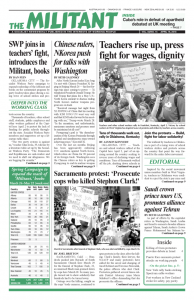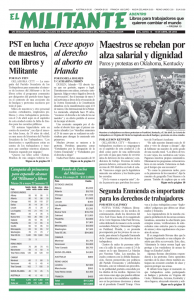Below is an excerpt from “The Struggle for Cultured Speech,” published in Pravda, May 16, 1923, a chapter in Problems of Everyday Life: Creating the Foundations for a New Society in Revolutionary Russia by Leon Trotsky. The title is one of Pathfinder’s Books of the Month for April. Trotsky was one of the central leaders of the 1917 Bolshevik Revolution. Copyright © 1973 by Pathfinder Press. Reprinted by permission.
I read lately in one of our papers that at a general meeting of the workers at the “Paris Commune” shoe factory, a resolution was carried to abstain from swearing, to impose fines for bad language, etc.This is a small incident in the turmoil of the present day — but a very telling small incident. Its importance, however, depends on the response the initiative of the shoe factory is going to meet with in the working class.Abusive language and swearing are a legacy of slavery, humiliation, and disrespect for human dignity — one’s own and that of other people. …
[T]he revolution is in the first place an awakening of human personality in the masses — who were supposed to possess no personality. In spite of occasional cruelty and the sanguinary relentlessness of its methods, the revolution is, before and above all, the awakening of humanity, its onward march, and is marked with a growing respect for the personal dignity of every individual, with an ever-increasing concern for those who are weak. A revolution does not deserve its name if, with all its might and all the means at its disposal, it does not help the woman — twofold and threefold enslaved as she has been in the past—to get out on the road of individual and social progress. A revolution does not deserve its name, if it does not take the greatest care possible of the children — the future race for whose benefit the revolution has been made. And how could one create day by day, if only by little bits, a new life based on mutual consideration, on self-respect, on the real equality of women, looked upon as fellow workers, on the efficient care of the children — in an atmosphere poisoned with the roaring, rolling, ringing, and resounding swearing of masters and slaves, that swearing which spares no one and stops at nothing? The struggle against “bad language” is a condition of intellectual culture, just as the fight against filth and vermin is a condition of physical culture.
To do away radically with abusive speech is not an easy thing, considering that unrestrained speech has psychological roots and is an outcome of uncultured surroundings. We certainly welcome the initiative of the shoe factory, and above all we wish the promoters of the new movement much perseverance. Psychological habits which come down from generation to generation and saturate the whole atmosphere of life are very tenacious, and on the other hand it often happens with us in Russia that we just make a violent rush forward, strain our forces, and then let things drift in the old way.
Let us hope that the working women — those of the Communist ranks, in the first place — will support the initiative of the “Paris Commune” factory. As a rule — which has exceptions, of course — men who use bad language scorn women, and have no regard for children. This does not apply only to the uncultured masses, but also to the advanced and even the so-called responsible elements of the present social order. …
In addition to such social contrasts — obtuse bestiality and the highest revolutionary idealism — we often witness psychological contrasts in the same mind. A man is a sound communist devoted to the cause, but women for him are just “females,” not to be taken seriously in any way. Or it happens that an otherwise reliable communist, when discussing nationalistic matters, starts talking hopelessly reactionary stuff. To account for that we must remember that different parts of the human consciousness do not change and develop simultaneously and on parallel lines. There is a certain economy in the process. Human psychology is very conservative by nature, and the change due to the demands and the push of life affects in the first place those parts of the mind which are directly concerned in the case. …
Reactionary blockheads maintain that the revolution, if it hasn’t altogether ruined it, is in the process of spoiling the Russian language. There is actually an enormous quantity of words in use now that have originated by chance, many of them perfectly needless, provincial expressions, some contrary to the spirit of our language. And yet the reactionary blockheads are quite mistaken about the future of the Russian language — as about all the rest. Out of the revolutionary turmoil our language will come strengthened, rejuvenated, with an increased flexibility and delicacy. Our prerevolutionary, obviously ossified bureaucratic and liberal press language is already considerably enriched by new descriptive forms, by new, much more precise and dynamic expressions. But during all these stormy years our language has certainly become greatly obstructed, and part of our progress in culture will show, among other things, in our casting out of our speech all useless words and expressions, and those which are not in keeping with the spirit of the language, while preserving the unquestionable and invaluable linguistic acquisitions of the revolutionary epoch.
Language is the instrument of thought. Precision and correctness of speech are indispensable conditions of correct and precise thinking. In our country, the working class has come to power for the first time in history. The working class possesses a rich store of work and life experience and a language based on that experience. But our proletariat has not had sufficient schooling in elementary reading and writing, not to speak of literary education. And this is the reason that the now governing working class, which is in itself and by its social nature a powerful safeguard of the integrity and greatness of the Russian language in the future, does not, nevertheless, stand up now with the necessary energy against the intrusion of needless, corrupt, and sometimes hideous new words and expressions.

